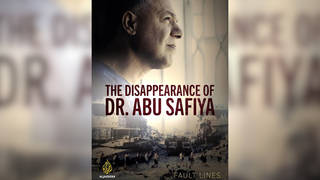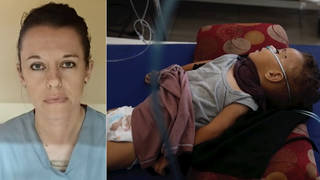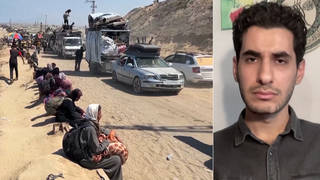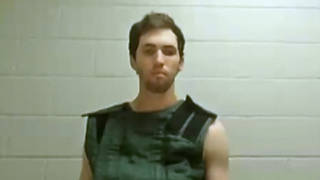Hi there,
From our first broadcast nearly 30 years ago, Democracy Now! has always been fiercely independent. Over these last 3 decades, our daily global news hour has been a source of truth in a media landscape all too often bought by commercial interests. Can you start a monthly donation? Monthly donations are the lifeblood of Democracy Now!.Can you start a monthly donation? Monthly donors represent more than 20 percent of our annual revenue. Every dollar makes a difference. Thank you so much.
Democracy Now!
Amy Goodman
Hi there,
From our first broadcast nearly 30 years ago, Democracy Now! has always been fiercely independent. Over these last 3 decades, our daily global news hour has been a source of truth in a media landscape all too often bought by commercial interests. Can you start a monthly donation? Monthly donations are the lifeblood of Democracy Now!.Can you start a monthly donation? Monthly donors represent more than 20 percent of our annual revenue. Every dollar makes a difference. Thank you so much.
Democracy Now!
Amy Goodman
Non-commercial news needs your support.
We rely on contributions from you, our viewers and listeners to do our work. If you visit us daily or weekly or even just once a month, now is a great time to make your monthly contribution.
Please do your part today.
HeadlinesApril 15, 2005
Three Roadside Bombs Rock Baghdad
Three roadside bombs exploded in Baghdad today, killing at least one civilian and wounding eight others. One of the bombs went off near a US convoy. At least five civilians were injured in the blast. A damaged Humvee could be seen in the area, which was sealed off by US forces. Another device exploded in an eastern neighborhood where US forces were also on patrol, killing one civilian and wounding three others, a police official said. The latest attacks came a day after twin car bombs killed at least 15 people in Baghdad–the highest death toll from an explosion in Iraq for more than a month.
Four Charged in UN Oil for Food 'Scandal'
Four more people were charged Thursday in the so-called UN oil-for-food scandal. Among them-a Texas oil executive and a South Korean businessman who was at the center of a 1970s corruption case involving Congress. The indictment also suggested that money allegedly skimmed from the oil program might have ended up in the hands of two U.N. officials. Their names were not released. One of the indictments charges Texas businessman David Chalmers, who is the sole shareholder of Bayoil and two oil traders with paying millions in secret kickbacks to Saddam Hussein’s government to secure oil deals. The fourth person charged was Tongsun Park, a South Korean citizen and fugitive who allegedly accepted millions of dollars from the Iraqi government while he operated in the United States as an unregistered agent for Baghdad. In the 1970s, Park was at the center of what became known as the Koreagate scandal, in which he was accused of trying to buy influence in Congress.
Bolton Faces More Allegations That He Tried to Fire Analysts
Now to the battle over President Bush’s nominees. The Washington Post is reporting that In 2003, John Bolton, Bush’s nominee for U.S. ambassador to the United Nations, ordered a young official working closely with then-Secretary of State Colin L. Powell removed from duties in the State Department’s nonproliferation bureau in what U.S. officials described as a third attempt by Bolton to purge career officials he perceived as impeding his policy goals. The officials told The Post that Rexon Ryu, an expert on nonproliferation issues in the Middle East, was transferred to another bureau after he failed to produce a document requested by Bolton’s chief of staff. Bolton reportedly accused Ryu of concealing the information and of insubordination. One of the officials recalled Bolton saying that he had a file on Ryu and did not want him to work on issues he was involved in. Ryu’s former boss said that Ryu was a brilliant and dedicated civil servant, and that the allegations were found to be baseless. Democrats blocked a vote on Bolton this week, pushing it to next week. They are hoping that new information may persuade Republican Sen. Lincoln Chafee to vote against the nomination. Republicans have a 10 to 8 majority on the committee.
Negroponte Confirmed By Senate Committee
Meanwhile, the Senate Intelligence Committee has put the man who coordinated the bloody Contra War of the 1980s one step closer to being in charge of US intelligence gathering. John Negroponte was approved yesterday in a closed-door vote, clearing the way for the full Senate to vote on his nomination as the country’s first Director of national Intelligence. The Committee also approved Lt. Gen. Michael Hayden as deputy director.
Bush Bankruptcy Bill Passes
In other news from Capitol Hill, Congress passed legislation, long sought by credit-card issuers and championed by President Bush, to force some consumers to pay part of their debts in bankruptcy. The bill represents the most comprehensive overhaul of U.S. bankruptcy laws in 25 years. The measure is Bush’s second legislative victory this year in his drive to end what he calls frivolous court cases that sap economic growth.
Controversial Judge Griffith Confirmed
The Senate Judiciary Committee voted yesterday to send one of President Bush’s controversial judicial nominees to a vote in the full Senate. Thomas Griffith would serve on second most-powerful court in the country. Only 4 Democrats on the committee opposed his nomination. Griffith had been criticized by Sen. Patrick Leahy for not obtaining a law license in Utah five years ago, and for practicing with an expired license in Washington, D.C. without telling his clients.
Bill Frist Says Dems 'Against People of Faith'
As the Senate heads toward a showdown over the rules governing judicial confirmations, Senate Majority Leader Bill Frist has agreed to join a handful of prominent Christian conservatives in a telecast portraying Democrats as “against people of faith” for blocking President Bush’s controversial nominees. The telecast is being organized by the Family Research Council and is scheduled to originate at a Kentucky megachurch the evening of April 24. Promotional materials call the day “Justice Sunday” and depict a young man holding a Bible in one hand and a gavel in the other. The flier does not name participants, but under the heading “the filibuster against people of faith,” it reads “The filibuster was once abused to protect racial bias, and it is now being used against people of faith.” Organizers say they hope to reach more than a million people by distributing the telecast to churches around the country, over the Internet and over Christian television and radio networks and stations.
Bush Doesn’t Do E-Mail
President Bush said on Thursday he does not send e-mail, not even to his twin daughters, because he fears “my personal stuff” would be made public. In a meeting with the American Society of Newspaper Editors, Bush volunteered his aversion to e-mail during a discussion on whether his administration is sufficiently responsive to requests made under the Freedom of Information Act. Bush said he avoids email because “everything is investigated in Washington” and as a result “we’re losing a lot of history, not just with me, but with other presidents as well.”
War Tax Protests Across the US
Today is tax day here in the US. But not everyone is rushing to get their papers filed. In at least 50 communities across the country, demonstrations are planned at Internal Revenue Service offices, Federal buildings, post offices, and other public places to protest the use of tax dollars to fund the wars in Iraq and Afghanistan. Many of these events will include people giving their tax dollars to community groups instead of to the IRS. We’ll have more on this later in the program.
Carter Says Rich States ’Don’t Give a Damn’ About Poor
Former President Jimmy Carter harshly criticized the US and other wealthy states for being stingy with foreign aid and said in rich countries “We really don’t give a damn.” In a speech to a human rights conference in Atlanta, Carter said increasing financial assistance was critical to battling malaria, AIDS and other common diseases that disproportionately affect the poorest parts of the world. He especially criticized the United States for failing to follow other Western nations which are increasing spending.
Study: Prisoners Feel Lethal Executions
A new study published this week in the British medical journal, the Lancet, charges that some prisoners executed by lethal injection might be so inadequately sedated that they are awake enough to suffer agonizingly painful deaths. Researchers who studied blood samples of prisoners after executions found that more than 40 percent contained levels of anesthesia so low that the prisoners might have been conscious during their executions. They also found that executioners in Virginia and Texas, homes to the nation’s busiest death chambers, were not trained to administer anesthesia. The authors of the study called for a moratorium on lethal injections.
Ken Saro-Wiwa’s Father Dies at 101
The father of Nigerian human rights activist and playwright Ken Saro-Wiwa has passed away. Jim Beeson Wiwa, a chief of the Ogoni people of southern Nigeria, died on April 1 at his home in Bane, Nigeria. He was believed to have been 101 years old. After his son was executed in 1995 for his resistance to the Shell Oil Corporation, Jim Wiwa became a symbol of the Ogoni struggle to defend their land and people from Nigeria’s military regime and their corporate cronies. In 1998, Democracy Now!'s Jeremy Scahill and I were guests in Jim Wiwa's home in Ogoniland.
Rodolfo “Corky” Gonzalez Dies
One of this country’s leading Chicano activists has died. Rodolfo “Corky” Gonzalez passed away Tuesday in Denver. He was an iconic leader in the movement for justice and equality for Mexican-Americans in the Southwest and is credited with raising the nation’s awareness of the plight of urban Chicanos.
Most popular
- 1
- 2
- 3
- 4
Non-commercial news needs your support
Please do your part today.











Media Options